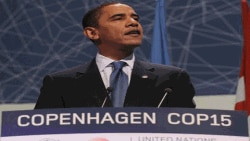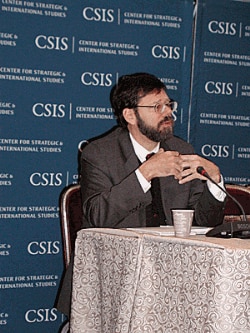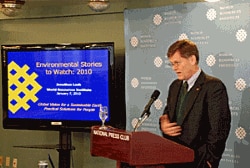Negotiators at the climate summit in Copenhagen last month failed to agree on a new climate change treaty to replace the current Kyoto Protocol before it expires in 2012. Jonathan Lash is president of World Resources Institute, an environmental policy group based in Washington. He was in Copenhagen for the climate summit and says he has been astonished by split reactions in the weeks after the meeting. "If you track the flow of blogs and columns that are coming across on this, the assessment ranges from catastrophe to success."
Copenhagen summit, failure and success
Forty-five thousand people attended the Copenhagen summit, including 100 heads of state and senior government officials. Jonathan Pershing, deputy special envoy for climate for the Obama administration, says the attendance was unprecedented and underscored the importance of climate change on a broad range of issues. "It speaks to trade. It speaks to energy policy. It speaks to diplomatic interests and initiatives that countries are undertaking. It speaks to development and development agendas of the poorest and the wealthiest."
In effect, Lash, who worked in Copenhagen as an observer and policy advisor, considers the summit two parallel meetings. He says it was a meeting where treaty negotiators failed to move the process forward and also a meeting that launched a non-binding political agreement forged by President Obama and leaders from China, India, Brazil and South Africa in its final hours. "This is the new world order. These were the leaders who were able finally to break through the disagreement. And they represent all of the major developing countries over whose emissions a lot of the tension had arisen," Lash says.
Uncertain outcome for promises made in Copenhagen accord
The United States signed, but never ratified the Kyoto Protocol. The Bush administration said the treaty was "flawed" because it would hurt the U.S. economy and did not require developing countries, including China and India, to reduce emissions.
The Copenhagen Accord is a 12 paragraph document that sets a 2 degree Celsius limit on future warming. Its provisions address emissions cuts, verification and deforestation. It would also commit 100 billion dollars from wealthy countries and global institutions over the next 10 years to help poor countries adapt to climate change. Pershing says robust developing countries won't get those funds. "But we want to know what they are doing because what they are doing will affect our reaction," he says.
While 30 heads of state signed the Copenhagen Accord, Lash says the agreement leaves many uncertainties in its wake. "We don't even know if everybody will stick to it. But there should be some indication by January 31st when countries who signed the accord are expected to submit their pledges for emission reductions. "If those commitments flow in, it's a very strong indicator that this agreement is real, that the heads of state meant what they said, they're willing to continue to implementation. If they don't, it will be a signal that it's beginning to disintegrate," Lash says.
At the Copenhagen summit, President Obama promised a 17 percent reduction in U.S. emissions by 2020, assuming congressional approval of pending climate change legislation. The law under consideration would put a price on carbon by capping emissions and allowing polluters to trade carbon permits. Pershing says the Copenhagen Accord, while not a perfect deal is helping to shape U.S. climate policy. "The objective we had was to create space for the [U.S.] Senate to feel that this was not inappropriate for the United States because we were not isolating ourselves. We were not moving forward without others. We, in fact, took the world with us. We now can demonstrate also that this is in our collective interest and we are going to play our role and our part," Pershing says.
But with Congress focused on the troubled U.S. economy and a partisan debate over health care, some experts fear the climate change legislation has lost its momentum. Even so, Pershing expects Congress to pass a climate change bill before the end of 2010. Failure to address the issue, he says, is not "a plausible scenario."






